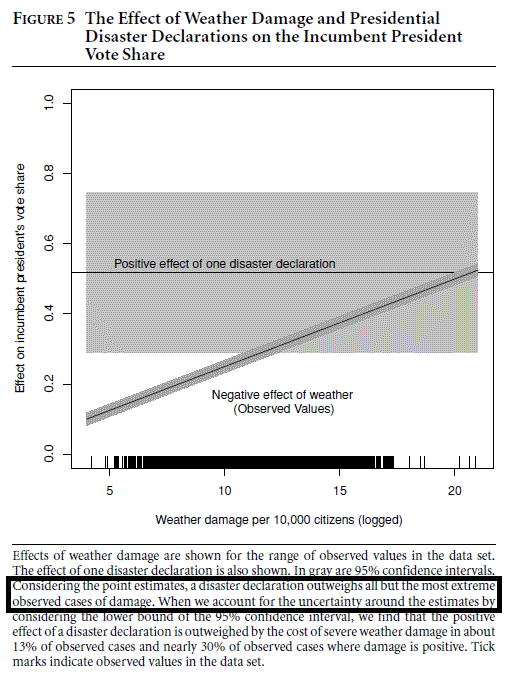I’ll speak to three possibilities, just for starters:
1) Sandy hurts Obama. As Larry Bartels wrote about a few months ago, incumbent presidents can be punished for natural disasters, including floods. Of course, a lot hinges on whether serious damage hits the key battleground states in Sandy’s path: Virginia and Pennsylvania, plus probably New Hampshire and maybe parts of Ohio. Given Obama’s apparent lead in Pennsylvania, it’s less likely that Sandy’s damage could swing that state against him. So the focus should be on the other states, I think.
2) Sandy helps Obama. Some research by John Gasper and Andrew Reeves finds that while both presidents and governors are punished for natural disasters, they are rewarded for a proactive response to those disasters. Presidents can overcome the effect of even the most severe weather damage in a particular location by declaring that location a disaster area (and therefore eligible for federal disaster funds). Here’s a graph that illustrates this, with the key part highlighted:

The open question, however, is whether any disaster declarations could happen quickly enough and visibly enough to matter on Election Day, only about a week after Sandy makes landfall.
3) Sandy limits early voting, possibly hurting Obama’s chances. David Axelrod is already suggesting this could happen. Alec MacGillis wonders if this could make a split between the popular vote and the Electoral College more likely, by potentially depressing turnout in blue states. Perhaps some early voters who are stymied by Sandy would then fail to vote later on, including on Election Day.
I don’t think this is likely. What the literature on “convenience voting” suggests is that measures like vote-by-mail and early voting tend to make it easier for habitual voters to vote, rather than stimulating turnout from marginal or infrequent voters. See this piece by Adam Berinsky. I’ll quote from the summary on his webpage:
Reforms designed to make voting “easier” exacerbate the existing biases in the composition of the electorate by ensuring that those citizens who are most engaged with the political world continue to participate. That is, voting reforms encourages the retention of likely voters from election to election rather than encouraging new voters to enter the electorate.
So, for example, those Marylanders inconvenienced by the cancellation of early voting on Monday will likely show up at the polls anyway, especially since this is a presidential election.
- Bulenox: Get 45% to 91% OFF ... Use Discount Code: UNO
- Risk Our Money Not Yours | Get 50% to 90% OFF ... Use Discount Code: MMBVBKSM
Disclaimer: This page contains affiliate links. If you choose to make a purchase after clicking a link, we may receive a commission at no additional cost to you. Thank you for your support!



Leave a Reply